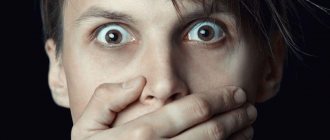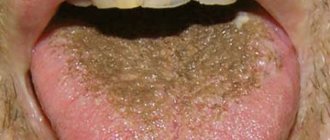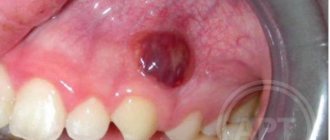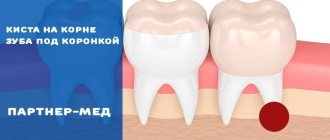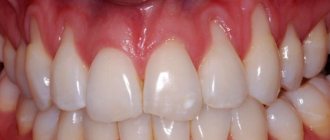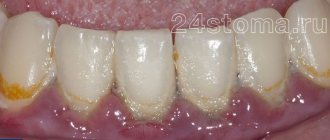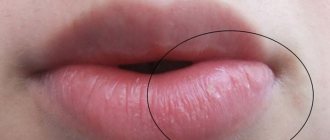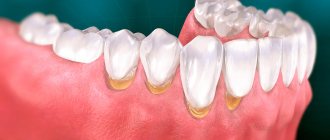This white ball is not the root of the hair, as is often thought. In fact, this is a dead bulb, which is located at the very beginning of each hair, and accordingly, with normal hair development and cyclical hair loss, we will always observe this white thickening in the form of a white tip. But if the fallen hair does not have such a white tip, then this means that the hair broke off for some reason before leaving the head. Most likely, this can be caused by the use of a hair dryer, frequent curling or dyeing, as well as increased hair porosity. Hair treatment shampoos and conditioners will help solve this problem.
You should sound the alarm if hair loss with a white tip begins to exceed your normal daily norm, or if the tip (bulb) is dark in color.
Where do the white tips come from?
At the end of each hair shaft there is a bulb (that same white tip).
Inside it there is a core - the papilla. Each bulb is quite tightly intertwined with blood vessels, through which both oxygen and nutrients flow to our curls. So, it is the papillae that are responsible for feeding the strands. When they die, the exhausted hair naturally falls off. Now let’s debunk one of the myths firmly entrenched in the minds of women. If you lose hair with a white tip, this does not mean that nothing else will grow in its place. After all, only the hair follicles are lost, not the roots. The latter cannot fall out. They just freeze and go into “sleep mode”. In this case, a new hair will not begin to grow in place of the lost hair.
If you part with several white “bags” every day, there is nothing to worry about. Your hair is thus renewed.
But when a lot of hair falls out - and almost all of it is on the bulb, you should be wary of this. Apparently, this occurs due to thinning of the follicles. The reasons for such changes must be clarified. Having correctly identified them, you can count on successful treatment and restoration of curls.
Benefits of color
Delicate color is created using various techniques (booking, highlighting and ombre). It is ideal for girls with a mermaid appearance: fair skin, sophisticated facial features and green (blue) eyes.
- The “brown blond” tone perfectly “fights” gray hair and is as close as possible to natural shades. It is also relevant for women with olive skin and brown eyes.
- Light strands harmonize perfectly with a tan and distract from imperfect facial proportions. Blondes with this shade of hair attract the admiring glances of others, and their image takes on sweet, romantic features.
- This color is relevant for strands of different lengths and structures. However, owners of sparse and weakened hair must use restorative masks and balms before dyeing.
Causes of loss
Hair can fall out for a variety of reasons. The main and most common one is the banal end of the life cycle. Nothing wrong with that.
Have you noticed that you are starting to lose too many white bulb hairs? This can happen not only due to improper care. Their massive loss along with follicles is a symptom of certain diseases and pathological conditions.
Let's consider what factors lead to the death of hair follicles.
| Nervous overload | State of chronic stress. |
| Severe psycho-emotional stress. | |
| Fast rhythm of life. | |
| Constant lack of sleep. | |
| Hormonal imbalance | Excessively high levels of the hormone dihydrotestosterone (in men). |
| Pregnancy. | |
| The period after delivery. | |
| Menopause. | |
| Diseases | Immune and autoimmune. |
| Skin diseases (dermatitis, psoriasis, seborrhea). | |
| Reproductive diseases (in women). | |
| Taking medications | Hormonal drugs. |
| Chemotherapy. | |
| Introduction of anesthesia. | |
| Deficiency of nutrients | Lack of vitamins. |
| Strict mono-diet. | |
| Imbalance of fats and proteins in the internal structure of the hair. | |
| Bad habits | Smoking. |
| Alcohol abuse. | |
| Incorrect care and handling | Using water that is too hot and too hard for washing. |
| Regular use of special styling products and devices (straightener, curling iron, hair dryer, varnish, mousse, gel). | |
| Backcomb and tight hairstyle (ponytail, braid). | |
| Frequent coloring. | |
| Negative external factors | Unsatisfactory environmental situation. |
| The influence of ultraviolet radiation. | |
| Exposure to radioactive substances. | |
| Poisoning with pesticides. | |
| Heredity | It appears more often in men. |
Types of alopecia
- Androgenetic. It occurs due to increased sensitivity of hair follicle receptors to male sex hormones (androgens).
How does it manifest ? Over time, the bulbs begin to produce thinner and weaker hairs until they stop working altogether. In men, the disease begins to manifest itself with the appearance of bald patches in the frontal area, women lose strands in the crown area.
How is it treated ? It is not completely curable, but maintenance therapy gives very good results. You will have to monitor the condition of your hair throughout your life.
- Diffuse. It is more common in women and has a root cause in some kind of health disorder: hormonal imbalances, gastrointestinal diseases, diets, stress, etc.
How does it manifest ? The hair thins evenly over the entire surface of the head 2–3 months after the occurrence of the traumatic factor.
How is it treated ? It is necessary to identify and eliminate the cause of the loss with the help of a specialist. To help your curls, you can take vitamin complexes, perform self-massage of the scalp, and use growth stimulants in your daily care.
- Focal. Almost always has an autoimmune nature. The disease manifests itself quite early, between the ages of 15 and 30 in people of both sexes. May affect eyebrows, beard, pubic hair.
How does it manifest ? Hair falls out in separate areas, forming bald patches in the shape of a circle or oval.
How is it treated ? This form of alopecia must be treated exclusively under medical supervision, since self-medication can cause worsening. In particular, the use of stimulants can cause a sharp increase in the size and number of hairless areas.
- Scar. It can be caused by trauma, inflammatory processes in the scalp, or systemic infections. The disease is characterized by irreversible damage to the hair follicles: they die and are replaced by connective tissue.
How does it manifest ? Hairless areas appear on the scalp along with itching, flaking, and soreness of the scalp. Hair shafts are actively falling out. Sometimes the disease is completely asymptomatic. Examination of the scalp shows the absence of hair follicle openings.
How is it treated ? It is necessary to seek medical help as soon as possible. External means are actively used: ointments, sprays, injections, etc. Sometimes a hair transplant is necessary.
Important! In unfavorable environmental conditions (big cities, industrial areas), almost everyone has alopecia to one degree or another. Typically, the pathology begins to manifest itself after 20 years with thinning of growing hair, and after 30, increased hair loss may already occur.
Diagnostics
For treatment to give a positive result, it is very important to identify the problem at an early stage of development. This requires diagnosis. You should consult a doctor when massive white-tipped hair loss has just begun.
First, it is advisable to visit a dermatologist, or better yet, a trichologist. Then you will need to donate blood for tests (general and biochemistry, presence of infections, hemoglobin and reproductive hormone levels). Additionally, you need to check your thyroid gland, because the quality of your life depends on its functioning.
Hair that falls out along with the bulb can be submitted for a special study - a mineralogram. If the test results do not show anything suspicious, make an appointment with the following specialists:
- gastroenterologist;
- neurologist;
- a gynecologist (to confirm or deny the fact of pregnancy and make adjustments to the regimen for taking hormonal contraception).
Diesel Forum
p.s.: as for me, I think that it is better to accustom yourself to take care of your hair in advance, well, periodically the body cleanses itself of toxins, go on a diet, drink vitamins, and of course masks, balms, sprays, etc.
Pysy: I’ll probably continue to periodically make a pepper mask for myself, since I don’t have an advanced version, it should help.
By the way, about the scrub! I read a lot about him on the internet and did it. I did this: salt + chamomile infusion + a couple of drops of rosemary + yolk. The impression left was twofold: when I washed my hair, the entire bathtub was full of hair. Moreover, it always got in my way when washing, but so be it! I was already scared, I thought I would go bald. But then the hair didn’t come out until the next wash. I looked and there was no hair on the sweaters. I got the impression that before he climbed gradually, little by little and constantly, and after the scrub once, all at once.
Treatment
Simply using a variety of cosmetics against hair loss with a white root, you are unlikely to get a lasting positive result. Even if the hair follicles become stronger and the blood supply to the scalp improves, the disease that caused hair loss will remain. This means that after a certain time they will climb again.
If you lose hair with white tips, you need to be treated comprehensively. External application of cosmetics directly to the hair is not enough. It is necessary to additionally take medications and procedures prescribed by the doctor, and also not to forget about multivitamin complexes and rules for caring for hair.
Professional methods
When a cosmetologist, trichologist or dermatologist recommends using professional methods to prevent hair loss, it is extremely unwise to refuse. The most effective procedures today are considered:
- scalp massage;
- laser therapy;
- mesotherapy.
They significantly improve blood supply to the scalp and tissue condition, accelerate metabolism, and stimulate the full restoration of damaged cells. The result is strengthening of the hair shaft along with the bulb.
In addition, manufacturers of professional hair care products provide a fairly wide range of lotions, mousses, gels, and balms. If used regularly, they can prevent hair loss and strengthen follicles. Also, these products have a beneficial effect on the root.
Despite your extensive experience in using various cosmetics, it is extremely important to carefully study the instructions supplied with them. After all, such lotions or balms must be used strictly in accordance with what is written in it.
Features of care
During the treatment and, of course, after its completion, you need to properly care for your curls:
- wash your hair only when it becomes dirty (it is advisable to do this no more than 2 times a week);
- Use natural shampoos whenever possible;
- regularly use nourishing masks (it is recommended to prepare them yourself);
- comb pre-dried strands in the direction from ends to roots;
- massage the scalp before going to bed (a 10-minute session is enough).
To increase the effectiveness of the treatment prescribed by the doctor, you can supplement it with your own arsenal of strengthening agents - serums, balms, tonics, lotions, cosmetic oils and growth activators purchased at the pharmacy.
Traditional methods
One of the best remedies for incipient alopecia is ordinary onions. It contains many very useful substances that nourish and support the hair follicle. If you still decide to use it, keep in mind that onion therapy should be carried out regularly for at least one month.
By making onion masks from time to time, you will only waste time, and your curls will not gain strength, but a specific amber.
A strengthening mask is made from onion juice. To do this, you will need to peel, wash and grind a medium-sized onion through a meat grinder (blender). Squeeze out the juice thoroughly and apply it to your hair. Wrap your head in a towel and leave the mask on for 20 minutes. All this time you should warm it up with a hairdryer.
You can eliminate the characteristic unpleasant odor after an onion therapy session by rinsing your hair with pre-diluted apple cider vinegar.
Palette of brown shades
Brown hair color has many shades that you need to know (this will make it easier to select a dye or toner before dyeing). Dark, rich colors focus attention on the natural beauty of a woman’s face, while light brown colors add a touch of romanticism and innocence to the entire image.
Let's look at the most common shades of brown:
Taupe
This tone is not natural, but it looks very impressive. Gray-brown simultaneously consists of warm and cold color tones, therefore it is universal for both white and dark skin. This color adds several years to a lady, so it is not recommended for adult women.
As for the color of the eyes, the tone goes well with everything except deep green - they can fade against the background of such hair.
Light brown
This tone harmonizes perfectly with the dark eyes and dark skin of their owner. It is strongly not recommended for beauties with light eyes: blue and gray.
Light brown tone is also called medium brown and soft brown.
Dark brown
This tone is ideal for those with fair skin and brown eyes. Dark brown color provides great opportunities for creativity and looks great on hair of any length. It is this shade that clearly emphasizes the bob hairstyle, forcing passers-by to pay attention to the woman.
Black-brown
Experts call this tone dark chocolate. It is considered one of the most common because it is able to emphasize any facial features and present them in the right light. After dyeing, the hair appears simply black, but, as a rule, individual strands are lightened to dark brown.
Thanks to this, the effect of a smooth transition is created, playing both outdoors and indoors with its bright colors.
Brown with highlights
Highlights are achieved by repainting individual strands a tone darker or lighter. This color shimmers brightly in the sun and complements the look of any lady.
Warm brown
The shade can vary from amber to caramel, depending on the light and the original hair color. Ideally complements the look of women and men with light brown eyes and tanned skin.
Light brown
It is one of the most popular and delicate tones in the entire palette. The shade is quite common in nature, which is why some girls consider it boring. Perfect for those with blue and gray eyes, as well as women with dark or pale skin.
Dark brown with cool undertones
It is a combination of light brown, fiery bronze, black, ash and smoky shades. Recommended for light-eyed girls with pale skin.
Red-brown
This shade was created specifically for extraordinary ladies. The tone has no restrictions on age or hair length: it looks great on both teenagers and older women. Stylists still recommend this color for girls with fair skin.
It will favorably emphasize their natural beauty and complement the image with a bright touch.
Bright brown
The color has several subtypes: cherry brown, honey brown and burgundy brown. Recommended for young girls with bright facial features and any eye color. And for women with dark skin, this color will make them stand out from the crowd.
Tobacco
Also called ash brown. Ideally complements the image of a girl with gray, blue and brown eyes with fair or olive skin. This color is preferred by gray-haired women - it is the one that best covers gray hair.
Brown
Brown brown is more of a collective name. It refers to a wide range of dark tones, from dark chocolate to light chestnut. The range of the shade can be either cold or warm.
Thanks to its diversity, any representative of the fair sex will be able to highlight interesting facial features and give more expressiveness to her appearance.
Rich brown
Of the entire palette, this color is the most popular among women of all ages. Actresses, models, singers and even government representatives are repainted in this tone. The shade emphasizes the femininity and sexuality of its owner.
Experts strongly recommend maintaining color - do not let red strands spoil the overall appearance of your hair.
Yellow-brown.
It also has a name - golden brown, and several subspecies: caramel and amber. Hair of this color will shimmer brightly in the sunlight and effectively highlight its owner.
And finally
As you have already seen, there is nothing wrong with hair loss with white tips. Provided that their number is small. Don't panic if someone tells you that you are losing your roots and will soon go bald. Nothing like this! They sit firmly in the deep layers of the epidermis. Therefore, there is always the possibility of further growth.
It's a completely different story when the root dies. However, there is no need to be afraid and go into a depressed state. At least before visiting a specialist. After all, hair falls out normally in every person. Both with and without the onion.
What to do if the cause of hair loss is a disease? First of all, understand the need for competent treatment. And remember: the sooner you start therapy and the more responsibly you approach it, the higher the chances of complete restoration of your curls.
Who is it suitable for?
The procedure is suitable primarily for blondes and brown-haired women. In this case, it is necessary to take into account the “temperature” of the natural hair color. Thus, warm blonde goes well with caramel and milk chocolate colored locks. Cold brown hair harmonizes, for example, with ash and platinum blonde.
Owners of light brown hair should dye their hair either blond or brown before such highlighting. Here the choice depends on the color type.
For cold color types, you need to pay attention to the following shades:
- cold blonde;
- bitter chocolate;
- dark chocolate;
- ash chestnut.
Suitable for warm color types:
- honey;
- wheat;
- caramel blonde.
Among the chestnut shades that look most advantageous:
- golden chestnut;
- milk chocolate;
- cappuccino;
- hazelnut.
When highlighting red hair with white and brown, shades are selected that are as close as possible to the natural color. Caramel and golden chestnut colors look most natural.
Features of the disease
White piedra, also known as trichosporia nodosum, Bejel's disease. This disease is an anthroponotic mycotic lesion of the hair cuticle. In simple terms, white piedra is a fungal hair disease. The disease is called nodular trichosporia because the spores of the fungus compress to form nodules.
This disease can more often be found in countries with a warm, tropical climate. It was first described in 1866. Doctors Y. Knoch, K. Lindeman discovered a fungus that provokes the development of the disease. This is Trichosporon beigelii.
White piedra is more common among men. The disease is especially common among those who wear a mustache, often curl it, and lubricate it with cosmetics. The fungus prefers straight hair, people with excessive sweating, damaged hair.
Nodular trichosporia (photo)
Trichophytosis
The causative agents of this pathology are mycoses (fungi).
Due to damage by mycotic elements, growth stops, fragility increases and hair breaks at the base of the scalp. The broken areas look like dark dotted formations. They are usually localized in the occipital and temporal regions.
- The hair shaft breaks off at the point where it exits the scalp.
- It is difficult to diagnose because the onset of the disease is not pronounced: single fractures are difficult to detect. Bald spots become noticeable only after a significant aggravation and spread of the disease to lesions with a diameter of 1 - 2 cm. By this point, from one to three months have passed, the mycoses have shifted to the middle and deep subcutaneous layers.
- In some cases, mycoses of a trichodermal nature, in the absence of correct treatment, spread to the keratin layer of the nail plates of the hands and feet and become systemic.
- In connection with the visualized foci of dark dots, the disease acquired the name “black dot trichophytosis”.
- The causative agents of a number of trichophytosis are anthropophilic fungi, specific parasites of the skin and the internal cavity of human hair.
- Another category of pathogens are zooanthropophilic fungi. These mycoses are transmitted to humans through contact with animals. They surround the hair follicle and cause inflammation.
- In boys, self-healing may occur in the first year of life.
- In girls, in the absence of targeted treatment, it becomes chronic and causes severe hair thinning, and in severe cases, complete baldness.
- Infection through tactile contact with sick animals (cows, horses, mice, stray cats and dogs).
- During communication with people who are carriers of “black dot trichophytosis”.
- Use of personal hygiene items for sick people. The fungus colonizes and the hyphae gradually grow into the skin structures.
- Acute hypovitaminosis of vitamin A reduces immunity to fungal diseases.
- Dysfunction of the endocrine system (multiple dysfunctions of the endocrine glands).
- Based on the classic manifestations, the dermatologist classifies the symptoms and gives directions for all the necessary tests.
- If necessary, the diagnosis of a newborn is agreed upon by a mycologist and an infectious disease specialist.
- A scraping is taken for microscopic examination for the presence of mycorrhiza. The mother can get acquainted with the results of the analysis in half an hour - an hour.
- In some cases, differential diagnosis is carried out with cultural identification of the pathogen. To obtain results, you need to wait a few days (4 - 7), during which, during a bacterial analysis on a nutrient medium, the spores obtained from scraping the newborn’s head will germinate. This type of analysis allows you to determine the sensitivity of the fungus to various types of drugs.
Types of dandruff
Seborrhea has two subtypes, it is divided into dry and oily. If, after washing the strands and drying them, your head begins to itch, and grains of a white hue are noticed in the curls, then you have dry seborrhea . Most often, the hair becomes brittle and splits.
Dry seborrhea is the most common type of dandruff, which causes a lot of trouble for those who suffer from it. Of course, because the grains have a tendency to fall off, and this significantly affects the appearance.
If washing your hair does not bring the desired effect, and the strands remain just as unkempt, then you are faced with oily seborrhea . In this case, no shedding of white particles occurs, however, the appearance still leaves much to be desired.
Since the grains are saturated with lard, fungi begin to multiply here. The curls look dirty in appearance, and the skin becomes very inflamed, which is why the hair begins to fall off.
Conclusion
The presence of white dots on the hair may indicate either a careless attitude towards your curls or a serious illness that requires the intervention of a specialist. Be that as it may, such changes are your hair’s “cry” for the necessary help!
All we have to do is offer a video in this article that will answer the questions that have arisen.
Did you like the article? Subscribe to our Yandex.Zen channel
Text \ Photo Ekaterina Posted 07/10/2015
0
share:
To favorites
To print
If you want to thank, add clarification or objection to the author - add a comment!
Currently being discussed:
- Lyubov Burkina
20.08.2018
What hair color should I choose? Please give me some advice. I don't know which one I have...
- I
19.08.2018
I had eyelash extensions for 6 months and took a break. After 3 months I increased it again...
- Vasilisa
18.08.2018
Cool hairstyle
18.08.2018
Hi, can I dye my bleached hair (currently red) bright purple...
16.08.2018
Hello! I am a dark girl with black eyes. I want to dye my hair dark...
15.08.2018
The photo shows young beauties. Can older ladies have their eyebrows done? Age...
Comments »
Somewhere in the middle of the hair a white dot appears.
Answers:
evil dwarf
secondly
Danai KHAN
just cut with scissors!!!
Lenchik
They don’t split, they break, these are different things, you need to strengthen them
Tasha
I had this after chemo
Ksyusha Myazina
This is brittle hair. Then at this place the hair will begin to split. The solution is to take multivitamins, buy a good balm/mask, and, if you already have a lot of hair like this, get a haircut.
Svetlana Khabipova
Yes, you really need to cut your hair. And for several months do not dye, do not perm, do not use hairspray, gel or hair dryer. First, strengthening masks 2 times a week, it is better to do it yourself, for a month. And then once a week, also for about 2 months. And then for prevention, once a month! Vitamins won't hurt either. Yes, and take care of your nerves - it also affects your hair!
Daria Efimova
you can’t break off beyond this point, it will only make things worse, it’s better to cut off a little above it
Lily
It's a break in the hair. from its dryness and damage.
